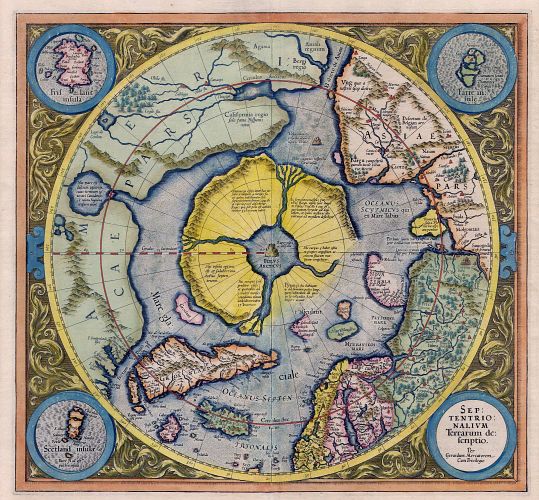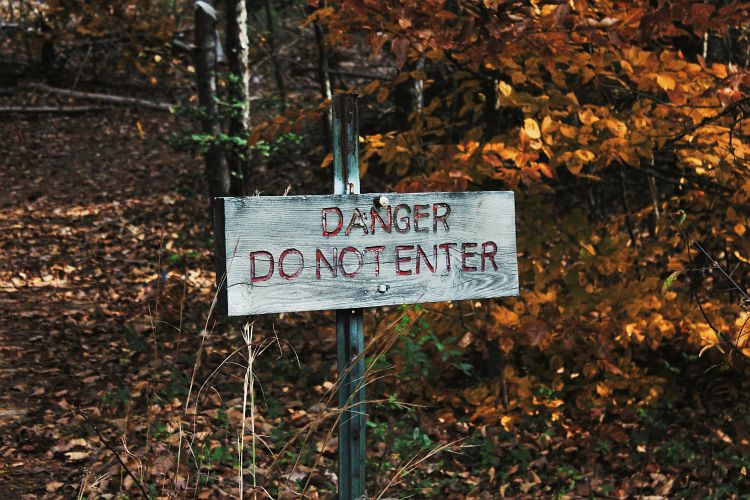During the time I had an identity problem and was searching for my identity, I was very attracted to books on highly sensitive persons and highly gifted people. My brother was highly gifted, and I looked up to him very much, and I felt I had to be like him too. Only then would I be allowed to exist. Many people in the world struggle with these things. I don’t know how many times I have heard, mostly women, say that they are highly sensitive, and then they look at you expectantly, whether you admire them. Because of course it is very special to be highly sensitive and to feel all the emotions of people as if they were your own. Apparently the normal state of the world is that you are totally insensitive! And if you are sensitive, you must be special, which I think is big nonsense. Also highly giftedness is something, whereby you can attribute special qualities to yourself. I also did that for a while. Some people are very talented, of course. Real highly gifted people learn top-down, they want to do it right the first time, without learning by making mistakes. Because of this, they sometimes run up against the limits of their body, or personality, and this frustrates them. In my case it soon became clear in clinical therapy that my great obsessive capacity to learn did not come from official highly giftedness, but that I was doing it purely for the attention. In other words, in order to be seen as special. My brother wasn’t doing it for the attention, he was really very smart, but that’s not surprising, because we were very well encouraged by my parents, who were very involved with us, and challenged us early in life, which in itself is a good thing, but you must be careful that it doesn’t get out of hand, that you turn your children into a kind of ‘projects’ and you consciously want to make them as smart as possible and overload them with new impressions and experiences, and even worse: you don’t accept the limits of your own children. To start feeling your own limits, your parents have to take your limits seriously. What happens when you continue challenge a child, while he has not yet experienced parental love and patience for their limits or boundaries is that they can also start to learn top-down, especially if there is an emphasis in the family on achievements. This can cause a lot of frustration for the child, and the child can get fear of failure, or get angry, which also needs to be taken seriously. If you see this in your child, know that it may have something to do with your own behavior.
Anyway, my fast manner of learning back then, was mainly for attention! And that happens quite often with people, sometimes to a lesser, sometimes to a greater extent! These people want to be considered special, only then they feel like somebody. But it is not at all required to behave special to be accepted and to have self-confidence. How tragic it is if you need that to be proud of yourself? Achievements alone do not give you self-confidence, the biggest way to get self-confidence is when all your emotions (including aggression) are allowed to exist, that’s what it’s really all about! But for many people this is lacking. I don’t know how many people I’ve come across in my life, who start whining about being so highly sensitive and so highly gifted and who have all these super special gifts that you then have to look up to. And many people do look up to these people. Mostly they come across as excentric people who think it’s all about achievements (which in itself can be a good quality), and train themselves daily in all kinds of ways, as if they are some kind of superman or want to become one. They are often enormous know-it-alls, and you can see that a lot of energy has been put into the child in the area of learning, but on an emotional level they are absolute horrors. Then I think: what is actually the more important quality? Moreover, these highly gifted people allow themselves to be conditioned incredibly tightly by their in this day and age mostly materialistic environments, and therefore they lose sight of reality, and also common sense. Because you can be very intelligent, but still believe absolute lies. They are therefore often sensitive to authority, and are in awe of high specialist positions, while on these high specialist positions actually the biggest nonsense is sold with too much focus on specialist details, so the bigger picture is lost from sight and a truly critical attitude towards authority and what they are taught, is missing. In short, it is a totally one-way connection between teacher and student.
The education system is also set up so that those who can best recite and parrot learned information are the ones who get the highest grades! If crap goes in, crap comes out. You also see parents who encourage boundlessness in learning, for example, because they themselves are boundless in their encouragement, and then find it crazy that the child has tantrums or is bored. And yes, then classes are skipped, and the parents and their children feel like they are a big deal. Whereas I tend to think: what is being one or two years faster than another child in a lifetime? Nothing at all! For a child, however, it can be a very big difference, in terms of emotional intelligence compared to his older classmates. So I’m not directly in favor of skipping classes, and if I were a teacher, I’d really focus on strengthening the child’s weak points, rather than what they can already well accomplish.
Sometimes gifted people think only in terms of “being smart”. They then often complain about how others are so stupid, and they themselves are so smart. But they forget that they can also believe lies in certain areas, and that in other areas they are often not as smart as other children are, for example in the emotional area, or in the area of sports. They do not see that in some areas they know nothing of the world and can learn a lot, even from stupid people. Because you can also learn things from stupid people. It is important that a gifted person also learns to see the gifts of stupid people, which can lie in very different areas, or, even a more controversial point, the gifts of, for example, criminal people. Those who, like a true master thinker (see my article On the concept of ‘criticism’), clearly set themselves above another on the basis of mere cleverness, clearly have yet to learn to see their own stupidity, their own ridiculousness, their own bad qualities, and their lesser points. Believe me, there are plenty of those in these people too. No one is special, or better said: we are all special!
The internet is full of sites about HSPs, Highly Sensitive Persons. In this respect the subject has been completely overused by the popular lifestyle magazines and psychologist practices. While it is absolute fiction. Being HSP means that you have certain characteristics, which are expressions of sensitivities. The special feeling that people get from it is thereby incredibly reinforced and that is precisely the pitfall of these people. Moreover, just as with sexual identity, it is pretended to be innate traits, which you are born with, as if it were some kind of gift, and there is an absolute blind spot to the cause of this high sensitivity. In my opinion, it is often the ability to become anxious that makes high-sensitive individuals so sensitive. You come across a lot of floating highly sensitive people, mostly girls, who are actually bursting with anxiety and would be better off considering therapy, rather than talking too much about their supersonic gifts. Tuning in to the other person because they are afraid that people will get angry at them is often part of the problem; you can just become very sensitive from that. But it’s always odd that these people don’t realize that’s the reason they’ve become so sensitive. They think that it is because of their great talents that they are allergic to all sorts of things and ask a lot of attention for these inconveniences, while it is actually the lack of effective psychological defense mechanisms, (the well-known “filter” they talk about so much), that has a big influence on their immune systems.
Especially when highly sensitive people are convinced of their specialness, they start thinking that they can feel other people’s feelings. While this is absolutely impossible for most people. There is always an interpretation in between, and such highly sensitive people happily fill in what they think they perceive in another person, based on, how could it be otherwise, their own feelings and projections thereof. For example, I once had a conversation with a girl after she had passed me on her bicycle, from a distance of 50 meters, and she told me that she senses a lot of things very well, and from my reaction to her “Hi!” and the way I turned my head, she could see that I was ear-minded! Would you believe? Hilarious! What a gift! Still, I do believe there are people who are gifted in this, but then you have to be able to convince me, just like the man did who once took an aura photo of me. That was mighty great! He immediately showed what he was capable of, which some people didn’t appreciate at all, but I didn’t feel offended that he looked right through me (and saw exactly what was happening in the emotional layer of my aura), and I was immediately convinced.
There are also many parents who cannot allow their anger towards their children (sometimes because they are afraid of being destructive in it, for example) and from that position attribute all kinds of talents to their child such as high sensitivity and high giftedness. Just to compensate their inner anger. Because a personality must always be in balance. This is sometimes very disgusting to see. For example, they are unable to teach the child to listen to them properly because they only have two modes. Endless encouragement, or destructive anger. And they are then unable to bring out their anger in a moderate way, to defend their boundaries, and their destructive anger they hold back, (thankfully). If you then express your boundaries or anger in a moderate way because you feel responsible, then they find you evil, bizarre is that! And that destructive anger that they deny in themselves settles in the image that they have of their child, and they can’t bear that and compensate by attributing special gifts to the child, while in reality there is no question of that at all. Then it is often said that it was an underachieving gifted person. Okay then! It is disgusting to see this because they are basically saying that their child must be special in order for them to take him seriously. But it’s not my place to say anything about that.
If people had insights into the different dynamics that take place within families, then you would quickly see, that many behaviors parents show towards their children are not as innocent as they look. Behind many types of behavior, there is an incredibly depraved mentality! In that respect, people can be good people, but as a parent they can behave like real demons. But as an outsider, it’s easy to judge that. Because you don’t know how people became like that. That’s why it’s important to talk about it, so that there is understanding, and you can put these things into perspective. Behind every person is a past comprised of often shocking stories.
For a while I suffered from a terrible urge to protect children. When I was about 24 years old, I had taken the children of acquaintances to the movies and it had been really nice. And they had behaved so well! And then I was with them and their parents afterwards, and then one of the two children had to go to bed, but he was still playing games on the computer. And when he didn’t quit his game fast enough, his mother immediately punished him. She didn’t get angry first, but he immediately got punished, while we had had such a nice evening, and they had behaved perfectly. And when he looked angry (he didn’t even express it, he just looked angry), she started talking down to him: “Do you think that will help you?” I was completely bewildered and then I voiced my displeasure. Later I made up for it with some flowers and a letter explaining how unjust I thought it was, and that I was sticking to that, but still. Sometimes the worst side of people comes out in contact with their children, and the contempt can be very subtle. But subtlety is not so subtle anymore, when it is repeated structurally. This mother I also caught regularly with the fact that she problematized emotions of her children, she thought her children were weird and saw all kinds of diseases in these emotions, without self-reflection and taking responsibility for her part in it.
For very young children it is often difficult to attach safely or even to feel comfortable with parents who are not doing so well, although these parents can be fine people otherwise. But yeah, there is a difference between how the adult comes across to an adult, or how the adult comes across to a somewhat older child, and how the adult comes across to a toddler or baby. Many behaviors of bad parents are already too violent for a baby. But on the other hand, young kids don’t recognize danger yet and that can also make them very indifferent, putting themselves in dangerous situations. A friend of my sister’s was an educator, and she listened to the child incredibly well from the first moment her daughter was born. She was incredibly adequate in how she treated the child, a very good parent. Her little daughter must have felt incredibly seen by her, from a very young age, and I find that very admirable, how you can be so very sensitive while your child is very young. As soon as a child starts crying, it usually gets to me, and I can’t give pure love, because it reminds me of violent situations in the past. I tend to get irritated and don’t know what to do with the child. And they sense that very well! Remember: a child pays a lot of attention to how you come across non-verbally.
Sometimes so many things have happened in a family, or a child has been wronged so much, that the child becomes suicidal as soon as he becomes an adult and has to stand on his own two feet. With many suicidal young people, it is often pretended that their suicidal state was caused by, for example, bullying! Or bullies are shamed because as a result of a bullying incident the young person in question eventually committed suicide, one thinks, while it was just very likely the straw that broke the camel’s back. You then see the emotional father or mother of the youngster appear on TV in all kinds of emo-documentaries or news show items that bullying must be stopped, while they themselves are the big culprit in the story and they themselves were the biggest bullies of their child, however hard this truth can be to accept. I am always amazed at the mothers who come to school, furious, because their child is bullied, and sternly address the class that the young people can’t utter unkind things against her child. Ridiculous! While this mother herself in the past regularly shook her daughter wildly if he or she did not listen immediately. So who is the biggest bully? Damn it, you’re 3x the size of your own child! Who formed your child’s character? How come he or she was not resilient and an easy bully victim? Children sense when a certain child is not in touch with his/her emotions. And they know exactly how to treat a child to make him/her feel his/her emotions again. It takes a little bullying to do that. But if the biggest bully of the child (their own parent) blocks the emotions of the child, because they can’t handle a bit of rebellion or criticism, then this bullying will not have the desired effect, and it will only be drops that will eventually cause the bucket to overflow. A very tragic thing.
All the examples I have mentioned in this arti cle are loosely based on experiences I have had with people around me, sometimes my family, sometimes friends, sometimes distant acquaintances, and sometimes just made up. So don’t take my words personally if you recognize yourself in them. Sometimes you see things around you that are not nice to see, and that you are actually disgusted by, but nevertheless they happen. In this respect I feel love for all these people, but also hatred, admittedly in a controlled way, but still! Looking at the Gospel of Luke 14:26, we see Jesus’ words: “If any man come to me, and hate not his father, and mother, and wife, and children, and brethren, and sisters, yea, and his own life also, he cannot be my disciple.” I console myself with the thought that it is moral to feel this criticism clearly, and to be honest about it. Who knows, maybe someday my words will be valued.





